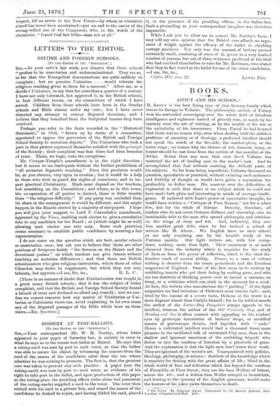LETTERS TO THE EDITOR.
BRITISH AND FOREIGN SCHOOLS.
[TO THE EDITOR OF THE SPECTATOR.")
SIR,—In your artic'e last week, you observe that these schools "profess to be unsectarian and undenominational. They are so, so far that the Evangelical denominations are quite unlikely to complain ; but no genuine Unitarian . . . would tolerate the religious teaching given in them for a moment." Allow me, as a decided Unitarian, to say that for more than a quarter of a century I have not only tolerated, but approved it, in the British schools, in four different towns, on the committees of which I have served. Children from these schools have been in the Sunday schools and Bible classes under my care ; but I have never detected any attempt to convey disputed doctrines, and I believe that they benefited from the Scriptural lessons they have received.
Perhaps you refer to the facts recorded in the " Historical Statement," in 1856, " drawn up by desire of a committee, appointed to oppose the perversion of the British and Foreign School Society to sectarian objects." The Unitarians who took a part in that protest expressed themselve satisfied with the principle of the Society ; their complaint was that there had been breaches of trust. These, we hope, were the exceptions.
Mr. Cowper-Temple's amendment is in the right direction ; but it seems to me inadequate without the further prohibition of "all sectarian dogmatic teaching." Even this provision would be, as you observe, very open to evasion ; but it would be a help to those who wish to guard the rights of conscience, and to im- part practical Christianity. Much must depend on the teachers, but something on the Committees ; and where, as in this town, the co-operation of all parties is desired, there is little trouble from "the religious difficulty." If any party was excluded from its share in the management it would be different, and this might happen in the Boards elected by a majority of ratepayers. I hope you will give your support to Lord F. Cavendish's amendment, approved by the Times, enabling each elector to give a cumulative vote to any candidate for the Board ; or (which might be as well) allowing each elector one vote only. Some such provision seems necessary to establish public confidence by securing a fair representation.
I do not enter on the question which are best, secular schools or unsectarian ones; but ask you to believe that there are other portions of Scripture beside " the Sermon on the Mount and the devotional psalms " on which teachers can give lessons without touching on sectarian differences ; and that there are British schoolmasters who give religious instruction, which those of other Churches may desire to supplement, but which they not only tolerate, but approve.—I am, Sir, &c., R. L. C.
[There is no manner of doubt that Trinitarianism was taught in a great many British schools ; that it was the subject of bitter complaint, and that the British and Foreign School Society denied a breach of trust and declined to afford any remedy ; and we con- fess we cannot conceive how any master of Trinitarian or Uni- tarian or Calvinistic views can avoid explaining in his own sense any of the disputed passages of the Bible which bear on those views.—En. Spectator.]




























 Previous page
Previous page